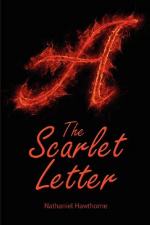The unfortunate physician, while uttering these words, lifted his hands with a look of horror, as if he had beheld some frightful shape, which he could not recognise, usurping the place of his own image in a glass. It was one of those moments—which sometimes occur only at the interval of years—when a man’s moral aspect is faithfully revealed to his mind’s eye. Not improbably he had never before viewed himself as he did now.
“Hast thou not tortured him enough?” said Hester, noticing the old man’s look. “Has he not paid thee all?”
“No, no! He has but increased the debt!” answered the physician, and as he proceeded, his manner lost its fiercer characteristics, and subsided into gloom. “Dost thou remember me, Hester, as I was nine years agone? Even then I was in the autumn of my days, nor was it the early autumn. But all my life had been made up of earnest, studious, thoughtful, quiet years, bestowed faithfully for the increase of mine own knowledge, and faithfully, too, though this latter object was but casual to the other—faithfully for the advancement of human welfare. No life had been more peaceful and innocent than mine; few lives so rich with benefits conferred. Dost thou remember me? Was I not, though you might deem me cold, nevertheless a man thoughtful for others, craving little for himself—kind, true, just and of constant, if not warm affections? Was I not all this?”
“All this, and more,” said Hester.
“And what am I now?” demanded he, looking into her face, and permitting the whole evil within him to be written on his features. “I have already told thee what I am—a fiend! Who made me so?”
“It was myself,” cried Hester, shuddering. “It was I, not less than he. Why hast thou not avenged thyself on me?”
“I have left thee to the scarlet letter,” replied Roger Chillingworth. “If that has not avenged me, I can do no more!”
He laid his finger on it with a smile.
“It has avenged thee,” answered Hester Prynne.
“I judged no less,” said the physician. “And now what wouldst thou with me touching this man?”




